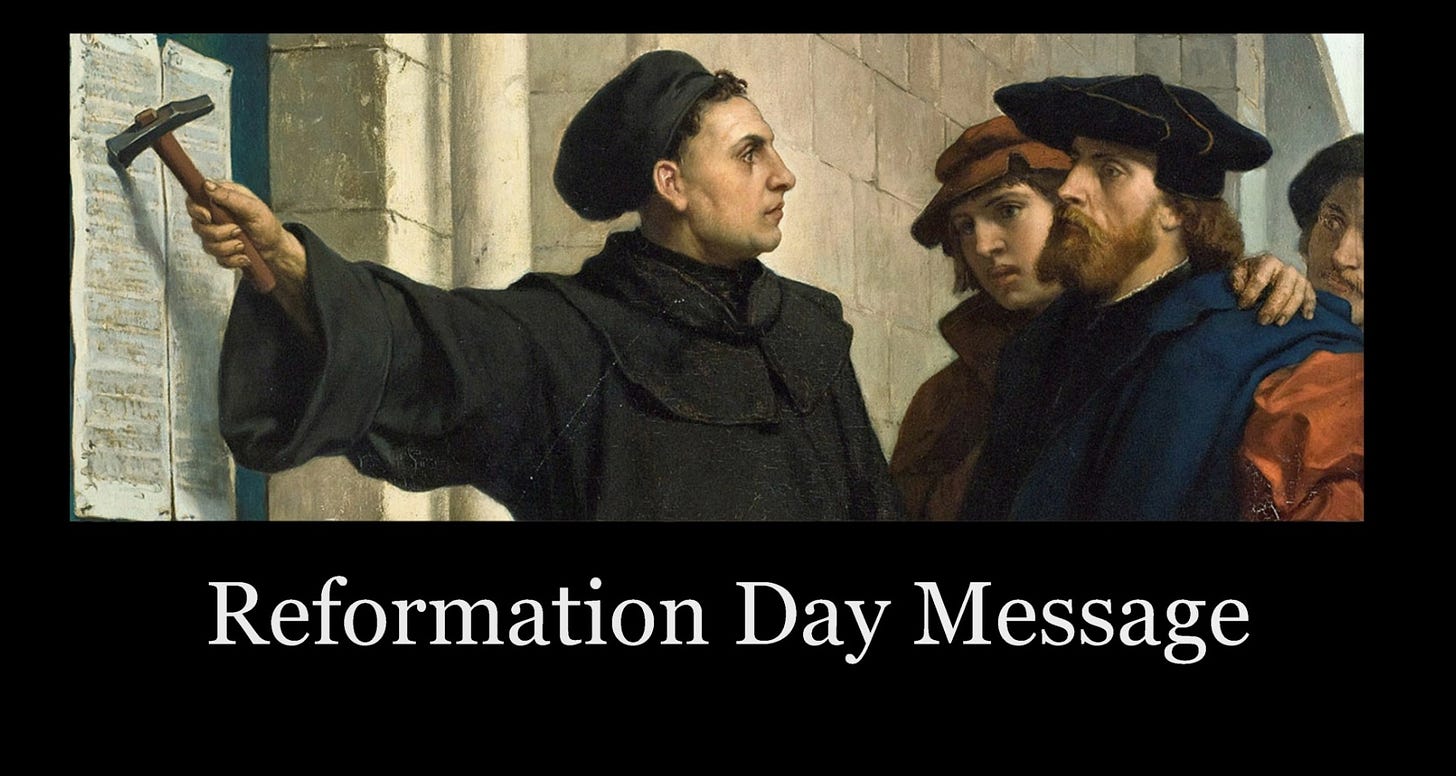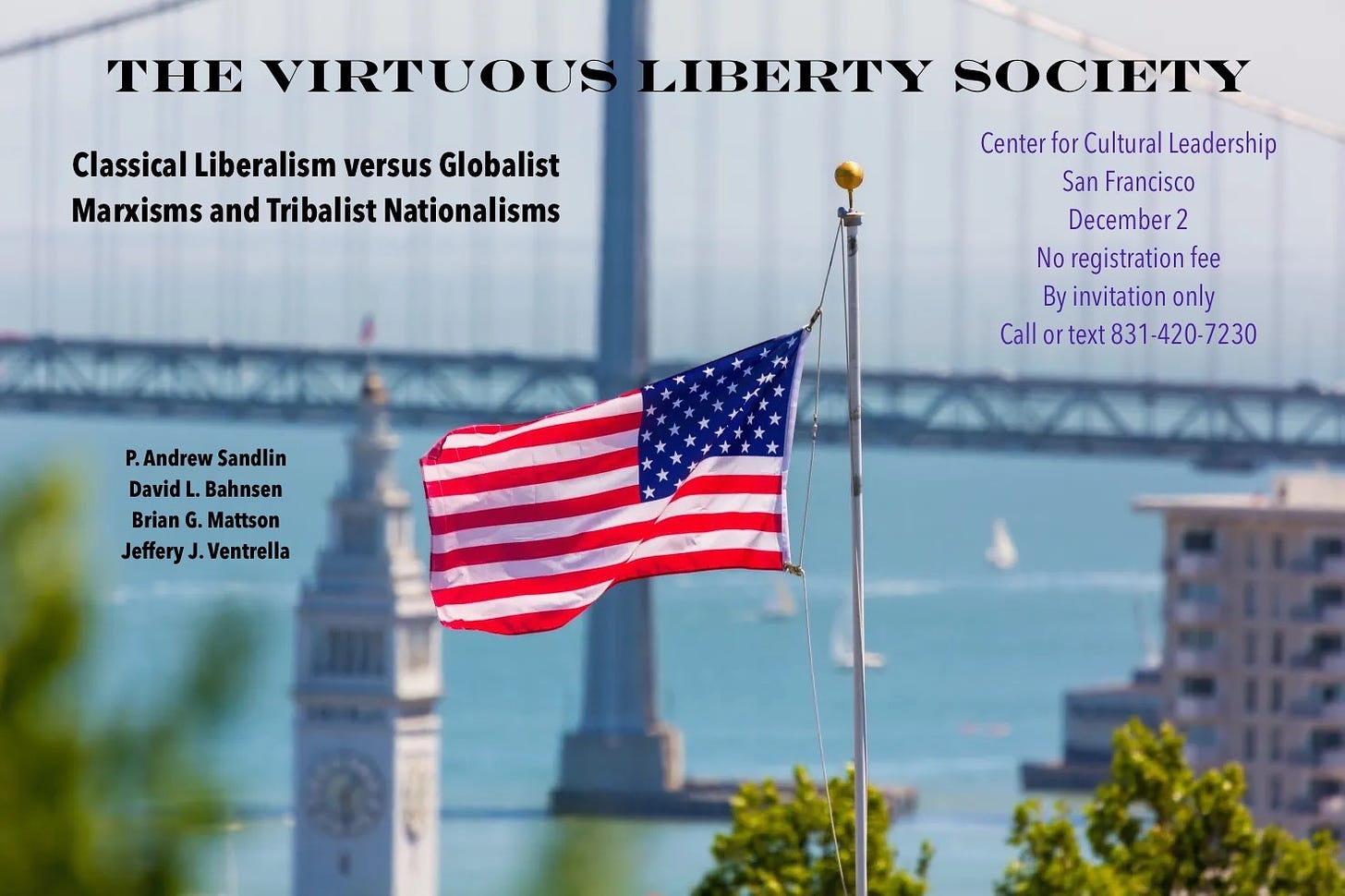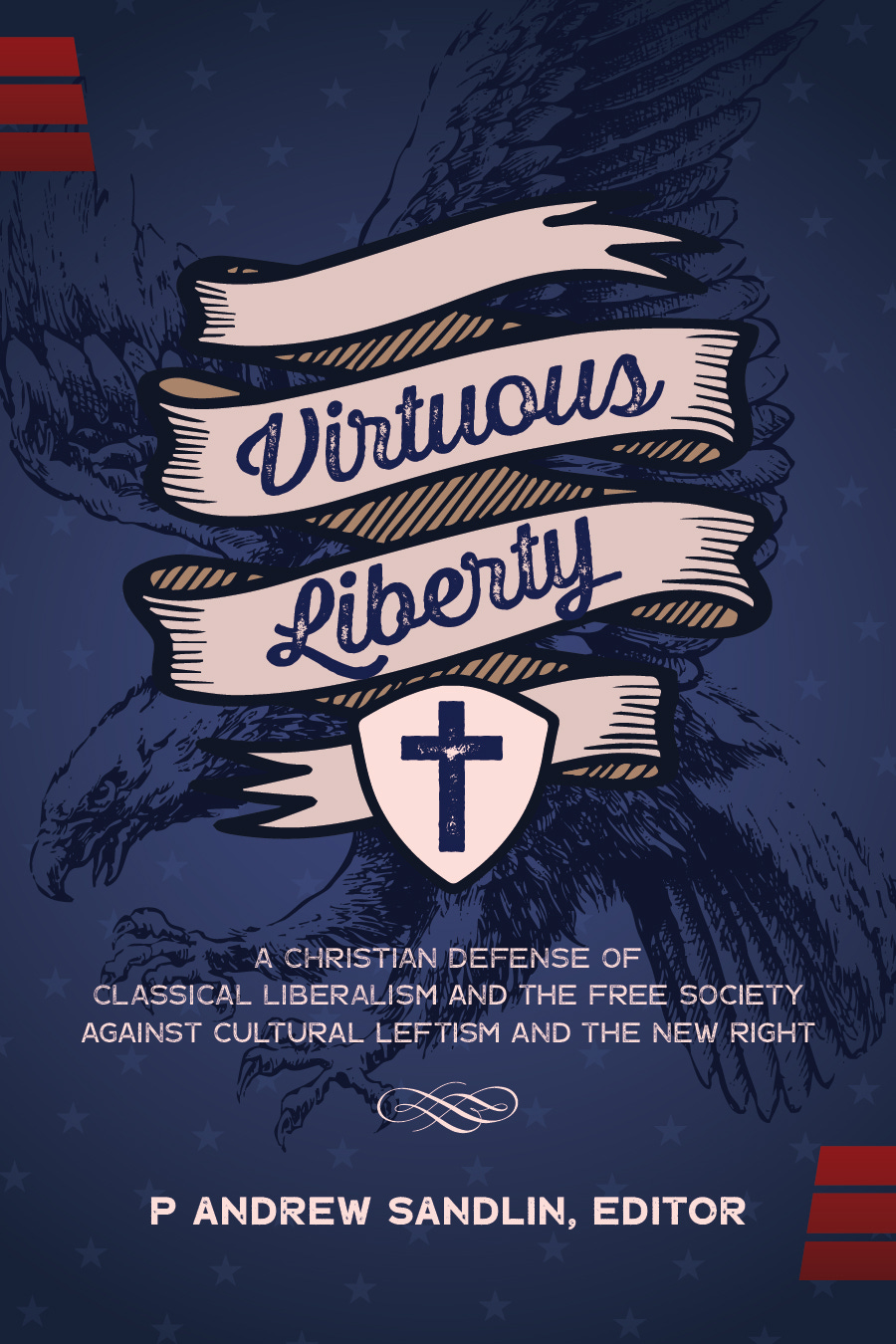Reformation Day Celebrates Worldview, Not Just Theology
Biblical Protestantism creates a distinctive way of thinking and living in God's world. It's worth celebrating.
Dear Friends and Supporters,
Today is an exciting celebratory holiday. I’m referring, of course, to Reformation Day, which all Protestants everywhere should be celebrating. Knowledgeable Protestants think almost immediately of the theology that sparked Luther’s protest against the medieval church.
For over a century and a half, historians and philosophers and sociologists have sidelined theology as the chief explanation for the Reformation. Instead, some like Marxists have argued that the chief causes were economic: the rise of the new 16th century commercial classes rebelling against entrenched hereditary feudalism. Many secular historians have claimed the chief cause was intellectual: Renaissance thinking soon to evolve into the European Enlightenment created increasing number of individuals wrestling with traditional authorities that stifled the free exercise of the intellect; the actual authority should be the mind of man rather than priests and kings. Still others argued that the new spirit of adventure and discovery exemplified by Christopher Columbus and Vasco da Gama conflicted with the static traditional social order of medieval Christendom. There are other explanations.
But the most obvious and indisputably the most accurate explanation of the chief cause of the Reformation is theological. Luther and his successors discovered (or, rather, recovered) the central theological truths that had been lost in the medieval world.
Sola Scriptura
The first is the Bible alone is the sole, final authority for belief and life. The Latin shorthand is sola scriptura, and it’s called the formal principle of the Reformation. The medieval church had gradually seen church tradition (her own church tradition, of course) as a coordinate authority with the Bible, and in the end this meant the Bible could not correct the church. This allowed for all sorts of contra- or sub-biblical practices like purgatory and the veneration of Mary and indulgences to creep into Western Christianity.
Not that the Reformers opposed tradition, but it had to be tradition justified by the Bible. For instance, all of them advocated the early Christian ecumenical creeds. All were Trinitarian. But this tradition had to be justified by the Bible.
Sola Fide
And then the second main theological point (the material principle) was salvation by grace alone through faith alone in Christ alone (sola fide, faith alone), not a combination of faith and works. We are not justified, or declared righteous, on the basis of our cooperation with God’s grace in Christ’s atoning work. God justifies us on the basis of Christ’s imputed righteousness, which is appropriated only by faith. By “faith” the Reformers meant whole-hearted trust in Jesus Christ, not assent to church dogma, which is how saving faith tended to be defined in medieval Romanism. Nor did the Reformers downplay good works. But works are the effect of salvation, not the (or even a) cause.
These two towering theological truths relentlessly impelled Martin Luther and, as a result, the Reformation. In fact, there could be no biblical Protestantism apart from sola scriptura and sola fide.
Theology Necessary, But Not Sufficient
But Reformation Day celebration can’t be a limited to theology. Over time Reformation theology fostered a new (or renewed) worldview, and as a result a different way of being a Christian in the world. While Roman Catholicism and Eastern Orthodoxy stand squarely within Christendom objectively considered, Reformational Christianity (like them) exhibits a distinctive worldview.
Here are three of those distinctives.
Inviolability of the Individual
First, the inviolability of the individual. Luther wanted to say that salvation is found not in the complex sacramental system of the church, which is what the medieval church taught, but in Jesus Christ. Luther was not anti-sacramental, and but for him Paul teaches that Jesus Christ, not the church, is God’s Reservoir of salvation. The medieval view is a soterically collectivist: we’re saved by becoming a member of the group. Luther taught we’re saved by becoming a member of Jesus Christ, and as a result we become a member of the group. For medieval Rome, Christ and the group are basically the same.
But this concept of the individual standing directly before God in Christ unmediated by the church didn’t stop with salvation. Eventually, it came to embrace other aspects of life, like the sociocultural. In the ancient world, and all the way into the medieval world, almost all societies saw the role of the individual as secondary to that of society itself. The individual is a cog in the mighty wheel of the state. By contrast, the Reformation laid the groundwork for what later came to be called classical liberalism. The role of the state is narrow and simple: to defend life, liberty, and property in terms of God’s moral law appropriate to the civil sphere. In the words of the Framers of the U.S., a nation founded on Protestant principles, government exists to protect the individual’s life, liberty, and pursuit of happiness. If the government doesn’t do this, it’s worthless. (We’ll elaborate on this topic in the impending book Virtuous Liberty: A Christian Defense of Classical Liberalism and the Free Society Against Cultural Leftism and the New Right; see below.)
If today you live in a society in which the state’s stated role is to protect your God-given rights (as most of you reading these lines do), your’re living in a society reflecting the Reformational worldview, whether that society actually protects those rights as it claims to.
Today movements on both Left and Right racing away from the inviolability of the individual and society break with the Reformational worldview. This is true on the Left, which wants to capture politics to impose its culturally Marxist vision, and it is true on the Right, which wants to commandeer the state to impose its populist nationalist vision. Both are anti-Reformational.
Please contact me privately to secure your place at the December 2 symposium. As I write these lines, only seven spots are left. As always, there will be no video or audio.
The day includes a gourmet lunch and a complementary copy of the hard-hitting new book 𝑽𝒊𝒓𝒕𝒖𝒐𝒖𝒔 𝑳𝒊𝒃𝒆𝒓𝒕𝒚: 𝑨 𝑪𝒉𝒓𝒊𝒔𝒕𝒊𝒂𝒏 𝑫𝒆𝒇𝒆𝒏𝒔𝒆 𝒐𝒇 𝑪𝒍𝒂𝒔𝒔𝒊𝒄𝒂𝒍 𝑳𝒊𝒃𝒆𝒓𝒂𝒍𝒊𝒔𝒎 𝒂𝒏𝒅 𝒕𝒉𝒆 𝑭𝒓𝒆𝒆 𝑺𝒐𝒄𝒊𝒆𝒕𝒚 𝑨𝒈𝒂𝒊𝒏𝒔𝒕 𝑪𝒖𝒍𝒕𝒖𝒓𝒂𝒍 𝑳𝒆𝒇𝒕𝒊𝒔𝒎 𝒂𝒏𝒅 𝒕𝒉𝒆 𝑵𝒆𝒘 𝑹𝒊𝒈𝒉𝒕.
The presenters and topics are below, but every attendee will have a chance to comment on and question about the pressing issues in a respectful, dignified, informative atmosphere.
Plus, you’ll get to rub shoulders with other thoughtful Christians committed to Christian culture.
P. Andrew Sandlin: “We Need More Liberals: The U. S. Founders’ Way Is Still the Best Way”
Brian G. Mattson: “Children Shall Lead Them: Christian Nationalism, National Conservatism, and the New Masculinists”
L. Bahnsen: “Nationalist Economics: How Conservatives Are Aping Progressives”
Jeffery J. Ventrella: “The Old-Fashioned Rule of Law Versus the New Conservatives and the New Marxists”
Recovery of Creational Christianity
Second, the recovery of creational Christianity. By creational Christianity, I mean a Christianity that stresses the biblical idea of redemption as the restoration and enhancement of creation. The created order is, in the words of Genesis, “very good,” and Christ’s work on the cross is not designed to negate creation in favor of some “higher” spirituality. Jesus didn’t come to rescue us from the created world, including the material world. Rather, he came to redeem both immaterial and material that had been polluted by sin in the garden.
One of the last patristic fathers to champion creational Christianity was Irenaeus, who defended the Faith Against Gnosticism. But after him there was a gradual drift into sotericicism: the reduction of salvation to the promise of eternal life within the sacramental system of the church. The wider society was to be impacted only indirectly by this sacramental salvation. Society was the realm of “nature,” a neutral, non-Christian sphere of commonly agreed-on standards. The church is the realm of “grace,” transmitted within the complex sacramental system. The church is “heavenly” and everything outside the church is “earthly.”
Over time this idea worked itself out into a sidelining of creation, and a headlining of soteriology. But a Reformational worldview, particularly within the thought of Abraham, Kuyper, Herman Dooyeweerd, Hermann Bavinck, Cornelius Van Til and others saw that, in Bavinck’s language, “grace repairs and perfects nature”; it doesn’t overcome it.
The Reformational worldview perceived man’s primal calling as stewarding the world for God’s glory (Gen. 1:28-30, the cultural mandate), bringing the truth of the gospel to all aspects of culture, calling sinners to trust in Christ alone for salvation, receive the gift of the Spirit, and thereby become incrementally sanctified. In their own sanctification, they work to sanctify everything around them: families, jobs, education, music, economics, art, technology, science, and so forth. Non-creational Christianity sees the created world and human culture as sub-spiritual. Our goal is supposed to be following the Lord in a narrow pietistic way and preparing for heaven in a far-off eternal, disembodied abode.
Creational Christianity, the antithesis of this world-denying vision, is a critical contribution of the Protestant Reformation.
The Comprehensiveness of the Faith
Finally, the comprehensiveness of the Faith. The Reformation, as we have seen, recovered and re-asserted the final authority of the Bible in all things. It abolished dual-authority approaches (the Bible and tradition, Jesus and the church). It didn’t deny the importance of secondary, derivative authorities like the family, church, state, etc. But the Bible judges everything else and is judged by nothing else. The Reformers themselves weren’t always fully consistent with this in practice. For instance, both Luther and Calvin were confused about the authority of the Bible in the wider society. In his final chapter of the Institutes, when Calvin claims that societies outside the church should be governed by “the common law of nations” he seems not to understand how this might conflict with his idea that the Bible is our final authority in all things, not just all things in the church. The original Reformers lived in the waning days of medievalism and couldn’t detect all the imperatives their biblical principles entailed. The consistent application of newly devised or restored truths takes time.
But gradually the Reformational idea took root. Many of the English and American Puritans, for example, understood that the Bible must be authoritative outside the church, even in politics. And the neo-Calvinist thinkers following Abraham Kuyper in Holland grasped that God’s word must shape all of culture. This didn’t mean, of course the Bible explicitly addresses every issue under the sun from the value of pi to the ingredients for peach pie. However, the Bible shapes our understanding of everything we say and do, by explication or implication.
No Natural Law
This means, among other things, the Reformational worldview is simply not compatible with what is commonly known as natural theology or natural law. That is, we can’t frame a theology or an ethics while specifically excluding Jesus Christ and the Bible. Creation itself must be interpreted by the Bible. In fact, even in the garden before the fall, creation wasn’t enough for man to know God’s will. God didn’t invite Adam and Eve to inspect creation in order to formulate how they should live. He verbalized his revelation to them. How much more, since the fall, is it necessary for God to tell us his will specifically in words, and not just his will for the church.
Whenever you see CCL and others like us respond to pressing questions, like What about the Hamas attack on Israel and Israel’s response? or, What is the proper Christian attitude toward Covid lockdowns, or, How should Christians be assessing AI? with the answer, “Well, what does the Bible say, or if it doesn’t say, what principles can be legitimately derived from it,” you are observing to Reformational worldview thinking.
Conclusion
This Reformation Day, and every one that follows, don’t just celebrate Reformation theology. Celebrate, also, the Reformational worldview to which that theology leads. There are a number of variations within the Christian worldview, but none is more Christ- and Bible-honoring than the Reformational worldview.
Will you consider a tax-deductible donation to CCL via PayPal or Venmo? Or mail a check to CCL, Box 100, Coulterville, CA 95311. God uses you to keep us going — and expanding.
Personal
Just now I’m concentrating on putting the finishing touches on this relevant essay collection which should be out in about three weeks:
In addition, I’m diligently finalizing the December 2 symposium I mentioned above. By God’s grace, it promises to be the best attended and most impactful ever. Contact me to secure a final seat. And please pray.
Yours for the King,
Founder & President, Center for Cultural Leadership
Mattson on Israel-Hamas
I hope you’ll read my CCL colleague Brian Mattson’s bold, insightful, balanced article on the Israel-Hamas war here.
More great stuff:
The Center for Cultural Leadership site is here.
My Amazon author page (print and digital) is here.
My I-Tunes sermons, lectures and podcasts are here.
You can find my sermons and lectures at my YouTube channel.
Sign up to get my blog updates here.
Here’s my Twitter feed.
If you want to get the free exclusive hard copy publication Christian Culture, please send me a Facebook private message.
The CCL phone number is 831-420-7230.
The mailing address is:
Center for Cultural Leadership
P. O. Box 100
Coulterville, CA 95311







